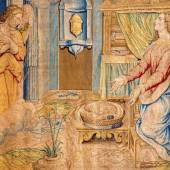Truly secular in life and death
By Rev. Dr. Babu Joseph, SVD
Some months ago, Mr Taurn Gogoi, former chief minister of Assam, passed away. With his departure, the state and the nation lost a seasoned politician and a sensitive human being. But he has left behind a wonderful example.
In his will he mentioned that after his death he would want his body to be taken to different places of worship before it is cremated. True to his wish, his body was taken to a temple, a church, a mosque, and a gurudwara before cremation. It was truly a great and unprecedented gesture shown by a public figure in India.
The late Mr Gagoi was truly a secular minded person. He respected all religious communities and maintained a healthy relationship with all of them. This is the essence of Indian secularism. It has never been a denial of religion but a positive acknowledgment and endorsement of each religion, whether in majority or in minority.
It is this great Indian tradition of "sarva dharma sama bhav" that has held our civilization together for several centuries. We have developed a unique culture of religious pluralism, a model for many countries around the world that is used to a mono-religious culture.
His gesture assumes greater significance at a time when our country is increasingly witnessing a push for a mono-religious culture by certain organizations and political parties. One can notice the kind of intolerance they have unleashed in the process to achieve their goal.
This trend is certainly worrisome for the simple reason that the pluralistic culture that we as nation have built over the centuries is being undermined and is going to change the very character of our national ethos.
Religious pluralism is the soul of India; temples, churches, mosques, gurudwaras exist side by side, and they all celebrate life together so much so that some religious festivals do not remain sectarian but are celebrated in common. For instance, Deepavali, Christmas, Eid, and several other festivals are celebrated across the country. This is the true India.
In an increasingly socially-fractured India, we need many more such sterling examples like the late Tarun Gagoi who would set a new benchmark in building an inclusive and tolerant society. There is an urgent need for public figures to show the example of respecting all religions in India, and thereby promoting good will among people of all religions.
I wish that we have more of social and political leaders that are open-minded and large-hearted. Only they can truly provide a larger national goal of religious harmony and social amity.
Radio Veritas Asia (RVA), a media platform of the Catholic Church, aims to share Christ. RVA started in 1969 as a continental Catholic radio station to serve Asian countries in their respective local language, thus earning the tag “the Voice of Asian Christianity.” Responding to the emerging context, RVA embraced media platforms to connect with the global Asian audience via its 21 language websites and various social media platforms.














